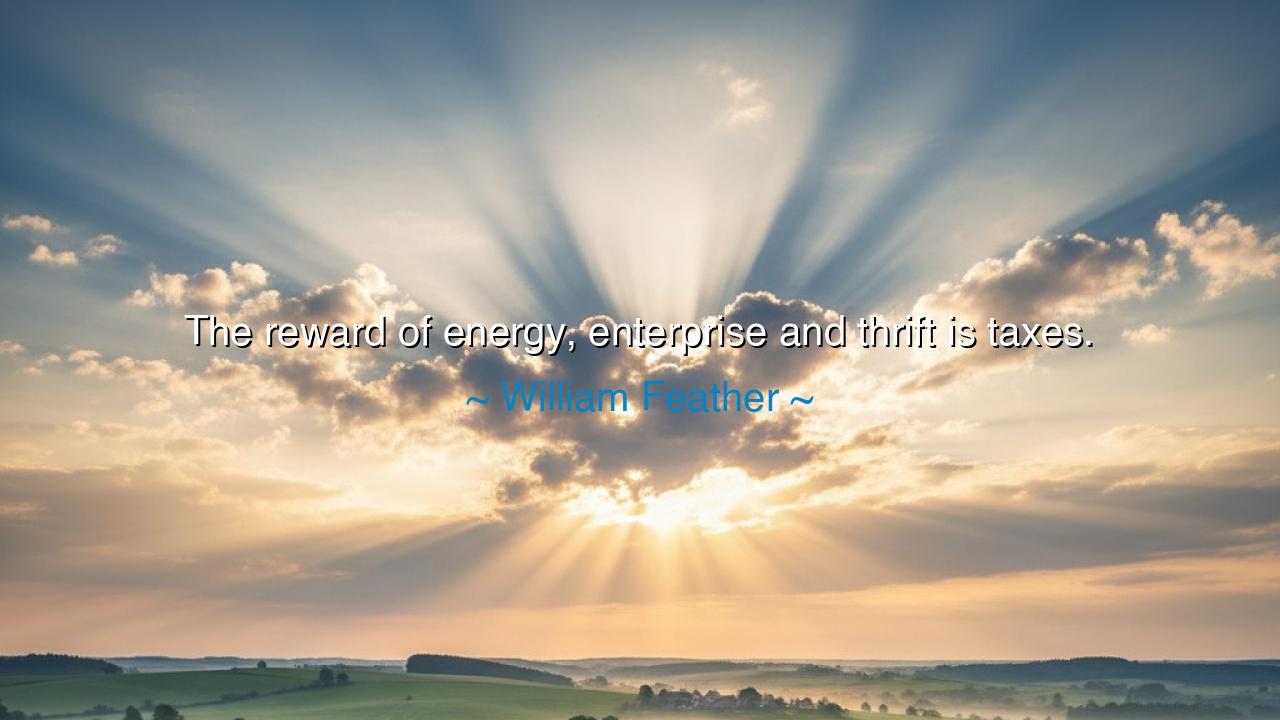
The reward of energy, enterprise and thrift is taxes.






“The reward of energy, enterprise, and thrift is taxes.” — William Feather
In this sharp yet wry observation, William Feather, the American publisher and essayist known for his practical wisdom, offers a truth as old as civilization itself — that success carries its burdens, and that prosperity, though sought by all, comes not without its price. His words blend irony with insight: the man who toils, who saves, who builds through sweat and sacrifice, finds his reward not in peace, but in taxation — the state’s claim upon his triumph. Yet beneath this jest lies something deeper and nobler: an acknowledgment that achievement and responsibility are twins, forever bound together.
To the unwise, Feather’s saying might sound cynical — a lament that even the fruits of labor are plucked by others. But to the discerning mind, it is not complaint, but perspective. For in truth, the existence of taxes is the sign of civilization itself. Only those who have produced can be taxed; only those who have created wealth can be called to share it. The ancients knew this balance well. In Rome, in Greece, and in every kingdom since, the builders, merchants, and farmers carried upon their backs the weight of empire. Their effort sustained the city’s walls, the scholar’s parchment, the soldier’s sword. Thus, Feather’s words remind us: the price of prosperity is contribution — that every man who gains from the world must, in some measure, give back to it.
Yet, there is irony still — for the more diligent and disciplined one becomes, the more one is asked to surrender. The man of energy, who labors tirelessly; the man of enterprise, who dares to risk and create; the man of thrift, who saves when others squander — all are rewarded not with indulgence, but with obligation. It is a strange fate: that the more responsible a man is with his own affairs, the more he becomes responsible for the affairs of others. Feather captures this paradox with wit — that virtue, by its nature, attracts demand. The strong must carry what the weak cannot; the wise must guide where the foolish falter. The tax of gold mirrors the tax of character.
History offers many mirrors of this truth. Consider Solon of Athens, the great lawgiver. When the city was collapsing under the weight of debt and corruption, Solon rose — a man of means, wisdom, and courage. Yet his reward for reform was not rest, but resentment. He freed the slaves, balanced the laws, restored justice — and was reviled by those whose privileges he curtailed. Like Feather’s “taxes,” Solon’s burden was the natural consequence of leadership and virtue. He gave not because it was easy, but because it was right. Thus, in every age, the price of excellence has been service, and the cost of enterprise has been accountability.
But let us not mistake Feather’s tone for despair. There is laughter within his wisdom — the laughter of one who has accepted life’s ironies without bitterness. To complain of taxes is to forget their meaning; they are the measure of one’s ability to give, the proof that one has built something worth taking. The pauper pays no tax, for he owns nothing. The idle man escapes the burden of the state, but also the honor of contribution. The taxpayer, though grumbling, stands as a pillar of society, his effort the foundation of the common good. What Feather calls “the reward” is, in truth, the acknowledgment of worth.
The lesson, then, is this: do not curse the price of prosperity. If the world demands from you more than from others, it is because you have proven yourself capable. Let your energy remain unbroken, your enterprise undaunted, your thrift unwavering. For though the reward may come wrapped in duty, it is still reward. To be taxed — whether by the hand of government or by the weight of responsibility — is to live as one who matters. The ancients said that the gods test most those whom they favor most; Feather’s words echo that same eternal law.
So, my child, if you find yourself weary from toil and burdened by the costs of your success, take heart. You stand among the few whose labor sustains the many. The reward of energy is not ease, but impact; the reward of enterprise is not comfort, but creation; and the reward of thrift is not hoarded wealth, but the power to give. Even when the taxman comes — whether of coin or of conscience — greet him with the calm of the wise. For in his shadow stands the proof that you have built, you have earned, and you have endured.
And that, though it may not feel like it, is the truest reward of all.






AAdministratorAdministrator
Welcome, honored guests. Please leave a comment, we will respond soon